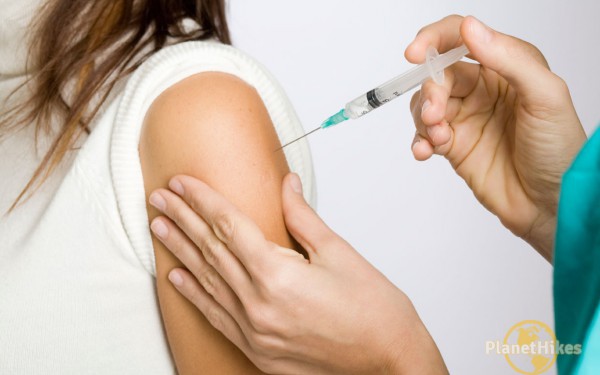To protect yourself while traveling, it is important to consider vaccination needs well ahead of time. Recommendations and requirements vary from country to country. Some vaccinations you may need must be administered four to six weeks before your trip. Though some require only a single shot, others are given in a series. If you have neglected to plan ahead and it is less than four weeks before your departure date, you should still see your doctor about possible immunizations. Here is some information about vaccines you should get before you travel.
Routine Vaccinations
Routine vaccinations are those that the Center for Disease Control and the Advisory Committee for Immunization Practices recommend that everyone receive to protect them even while living at home. For adults these include boosters for tetanus, diphtheria, measles, shingles, pertussis, mumps and rubella. Also recommended is an annual influenza shot. For children the list is more extensive and age-specific. Check with your doctor to be sure you are up to date with your routine immunization schedule. Though some of these diseases are uncommon now in the United States, they are more prevalent abroad, so it is important to be protected against them.
Recommended Vaccinations
The Center for Disease Control has immunization recommendations which vary from country to country. For example, when traveling to some countries it is important to be vaccinated against typhoid, Hepatitis A and Hepatitis B. In Southeast Asia, Japanese encephalitis is common, and if you travel in rural areas you need to have the vaccine series to protect yourself. In rural India, a polio booster is advised, and also possibly vaccination against rabies and malaria. Sometimes recommended vaccinations vary according to your specific travel plans, length of stay, the season in which you are traveling, your age and your health status. See your doctor, a travel clinic or the CDC website for information on recommendations for specific countries.
Required Vaccinations
According to international health regulations, only two vaccinations are required for travel to certain parts of the world. Yellow fever vaccinations are required for people traveling to parts of South America and sub-Saharan Africa. Some countries also require you to have this vaccination when traveling from a country where yellow fever is endemic. You are granted a waiver if you have a medical reason why you cannot be vaccinated. The vaccine is dangerous to infants under four months old and those with allergies to eggs. Pregnant women are urged to avoid areas with yellow fever, but if they need to travel to these areas, they must be vaccinated. In addition, since severe outbreaks of meningococcal disease in 2000 and 2001, the Saudi Arabian Ministry of Health requires all travelers to the country during the period of Hajj to have the meningococcal vaccination.
If you are traveling to places such as Canada, Europe, Australia, New Zealand and Japan, the health risks are no greater than those you might face in the United States. However, if you travel anywhere else in the world, be sure you educate yourself about health precautions and get specific immunizations well in advance.



Comments